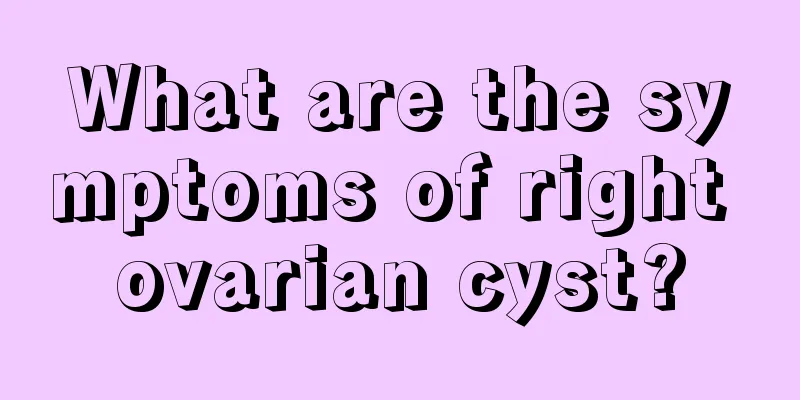What are the symptoms of right ovarian cyst?

|
Many women do not pay attention to long-term abdominal discomfort. Many of them go to the hospital for examination only after it affects their life and work. Later, they find that they have ovarian cysts. Therefore, it is necessary for women to understand the compression symptoms of ovarian cysts in the early stage of the disease, and to detect and treat them early. Let's follow the editor to understand the symptoms of ovarian cysts and take a look at the introduction in this article. As the ovarian cyst progresses, the patient will experience symptoms of ovarian cyst compression, feeling abdominal discomfort and swelling but no pain, which is very harmful to the health of female friends. Common symptoms of ovarian cysts include: A huge benign ovarian cyst fills the entire abdominal cavity, increasing the intra-abdominal pressure and affecting the venous return of the lower limbs, which can lead to edema of the abdominal wall and bilateral lower limbs; while a malignant ovarian cyst fixed in the pelvic cavity compresses the iliac vein, often causing edema of one lower limb, and compression of the pelvic and abdominal organs, resulting in dysuria, urinary retention, urgency or difficulty in defecation. The symptoms of ovarian cysts are mainly manifested in the following aspects: (1) Intra-abdominal masses. If an intra-abdominal mass of medium size or smaller has no complications or malignant transformation, its greatest characteristic is mobility. It can often move from the pelvic cavity to the abdominal cavity. The mass is generally not tender to touch. However, if there are complications or malignant transformation, not only will the mass itself be tender, but there may even be symptoms of peritoneal irritation. This is a common symptom of ovarian cysts. (2) Ascites. The presence of ascites is often a characteristic of malignant tumors, but benign cysts such as ovarian fibromas and papillary cystadenomas can also produce symptoms of ovarian cysts with ascites. Endocrine symptoms such as hirsutism, hoarseness of the voice, and clitoromegaly are symptoms of masculinizing cysts. (3) Cachexia, which is characterized by an extremely distended abdomen, emaciated, painful facial expressions, and severe exhaustion. The above are the common symptoms of ovarian cysts. I hope they will be helpful to female friends. If you experience symptoms of ovarian cyst, you must go to the hospital for treatment immediately to prevent the condition from worsening and causing serious harm to the patient. |
<<: Can uterine prolapse recover?
>>: What should I do if I don’t want to eat and feel like vomiting during pregnancy?
Recommend
Understanding Food Nutritional Fortifiers (Part 2)
Production principles of food nutritional fortifi...
What to do if you have amenorrhea due to dieting
Many women go on a diet and do a lot of exercise ...
How much does a glucose tolerance test cost?
The glucose tolerance test is to check whether th...
Vitamin D supplementation can improve sleep disorders in the elderly
Award-winning works (article category) of the Hea...
Why do guppies have red eyes? Why do guppies always tuck their tails?
Guppies are native to Venezuela, Guyana, the West...
What to do if the cesarean section incision becomes suppurated
We all know that the body will become particularl...
Smart eating in winter - are the nuts you eat carbohydrates or fats?
Nuts can be said to be the protagonists of the wi...
Thick rice paste for leucorrhea
If some people find that their leucorrhea becomes...
What causes vaginal bleeding during bowel movements?
Vaginal bleeding is a common problem for many wom...
How long will it take for the milk to stop during pregnancy?
Many mothers think that breastfeeding is a safe p...
What medicine should I take for a long menstrual period? This will have a good health effect.
The so-called menstruation occurs once a month, u...
Why do cotton T-shirts pill? What to do if cotton T-shirts pill
Friends who have worn pure cotton clothes will kn...
What to do if you have abdominal pain and bleeding during early pregnancy
The early stage of pregnancy is a particularly im...
Do you know these 15 small signs of cancer?
Lung cancer is one of the malignant tumors with t...
Small granulations appear on the vulva
Cleaning your vagina every day is something most ...









